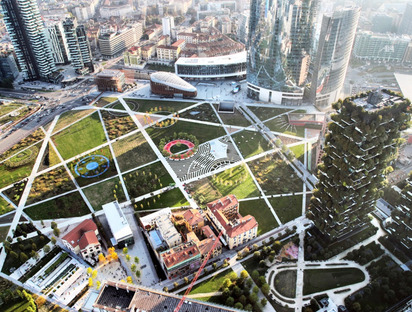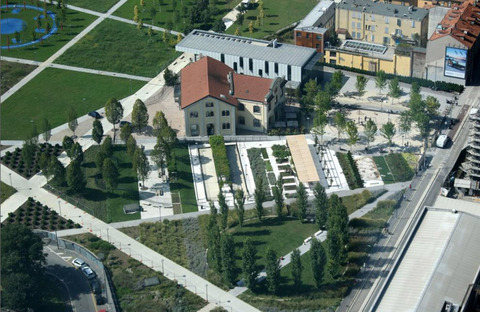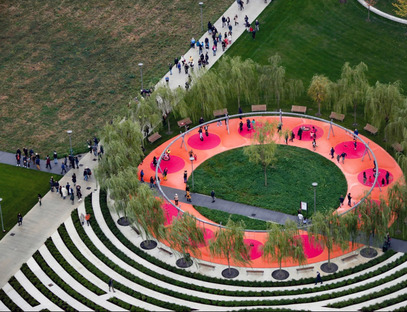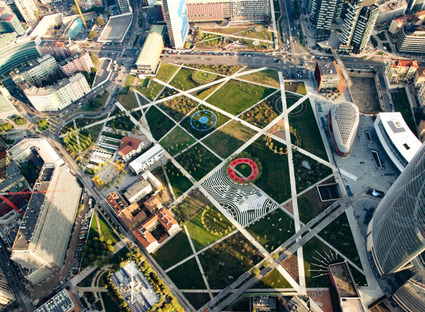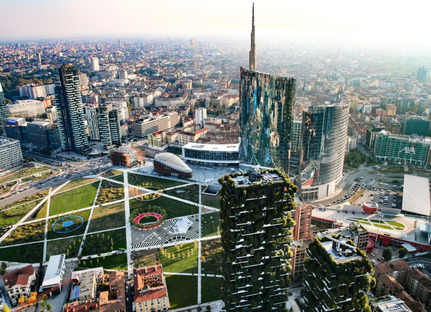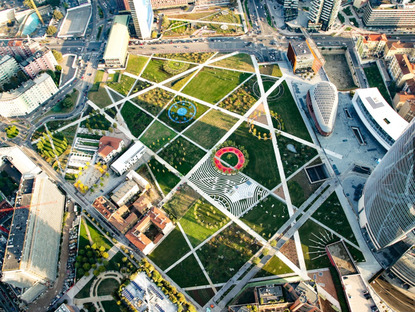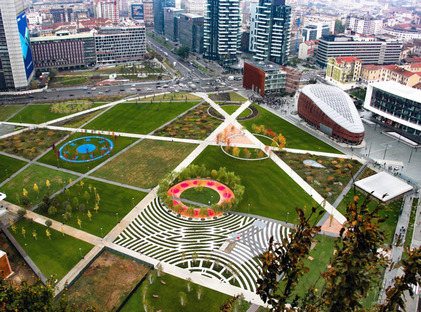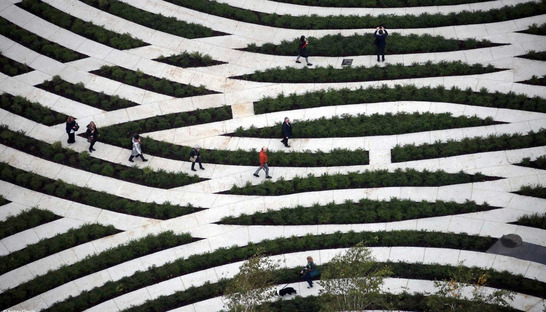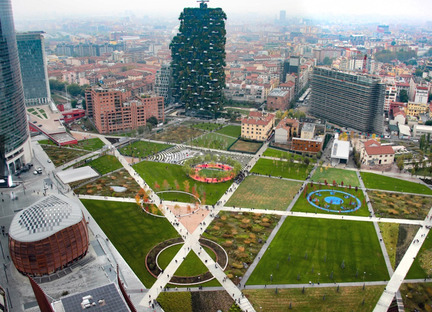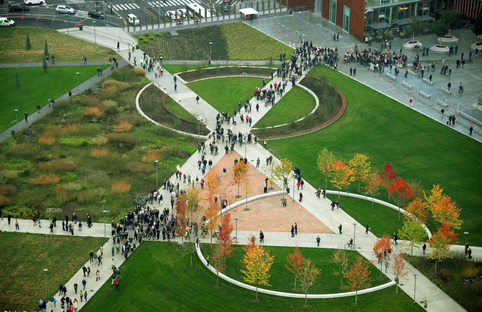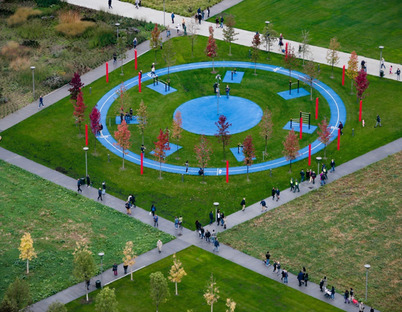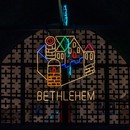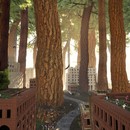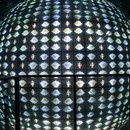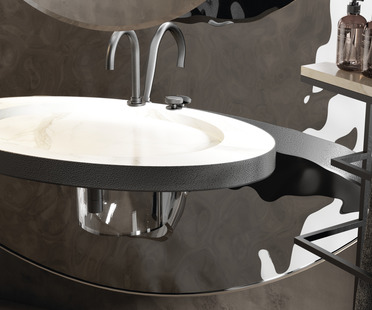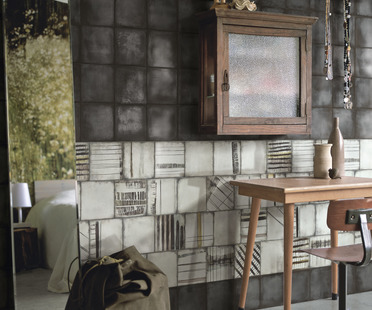09-07-2019
ONSTAGE: INTERVIEW WITH ALIDA FORTE CATELLA, FONDAZIONE RICCARDO CATELLA
Foundation ,
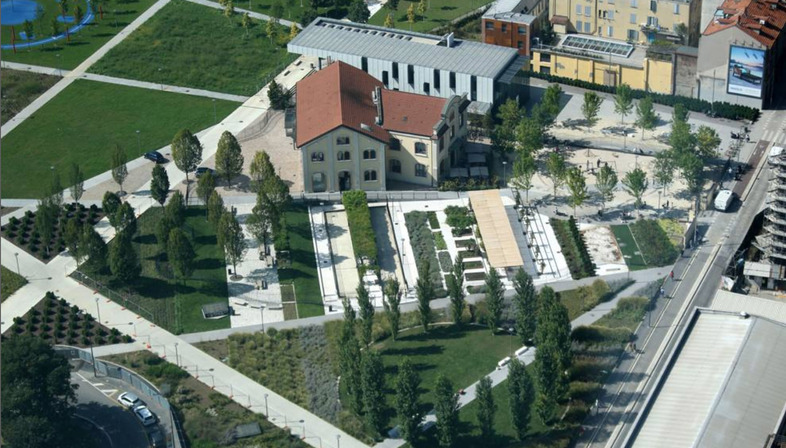
There are poignant, strong, minimal signs, full of symbolic incisiveness, which attest to violent deaths with indignation or severe blame, but there are also, light touches, hymns to life, which, as resilient, reminiscent marks, just through life, intend to perpetuate a memory.
My first encounter with the foundation dedicated to Riccardo Catella was, I would say, curious. I was impressed by the small house that against all odds resisted, living in a context that didn't really belong to it and forced to reexamine its existence from a different perspective. The remarkable difference with the surrounding, the international flavor of the neighboring high rises, and the extensive green lung that privileges it, emanated the alchemy of a fragment of time that had stopped.
A vision that resembled the perseverance and endurance of China’s ‘nail houses’, tiny homes whose owners opposed the real estate development, refusing large amounts of money for compensation. Those buildings remain, with their modest dimensions, in stark contrast in the midst of very modern cities, just like nails which, stuck with obstinacy in wood, can not be removed, becoming universal symbols of resistance in an increasingly urbanized and globalized world. An even greater surprise was to learn that it belonged to a family of entrepreneurs, real estate developers. What I was witnessing certainly could not correspond to the canons of a speculative building logic!
Fruit of a rather long gestation, 14 years of waiting, Fondazione Riccardo Catella was finally inaugurated in 2018 with its Biblioteca degli Alberi, 90,000 sqm of public park conceived by Petra Blaisse, from the Dutch studio Inside Outside. Philanthropic purposes and sustainable ends animate the spirit of its existence. Social and cultural initiatives, based on the involvement of the very young, include educational paths, workshops/laboratories dedicated to urban agriculture, realization and maintenance of vegetable patches in the thematic mosaic that constitutes the large garden, between aromatic herbs and an exuberant amount of tree varieties. The innovative approach intends to encourage inclusion and make citizens more responsible and aware towards a green heritage, severely at risk, and of vital importance for the quality of our lives. Children learn socializing among themselves and the activities foresee a mutual reciprocal generational exchange with the will to strengthen family’s bonds.
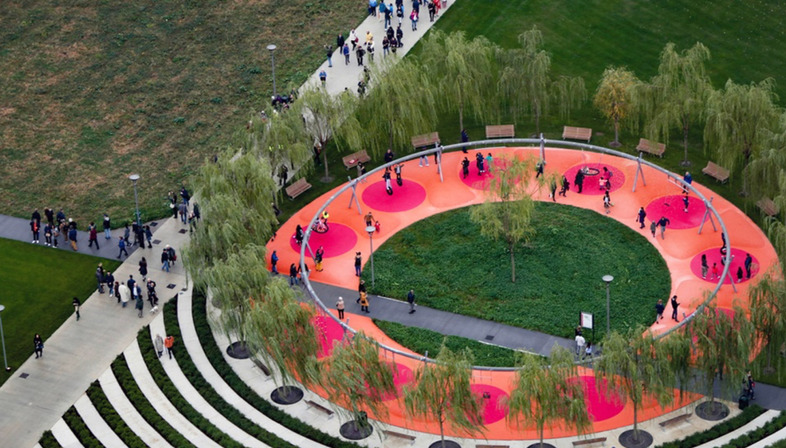
Caring of a piece of land, playing and acting, proves to be excellent for anyone, helping especially children with serious illnesses and disabilities, and, for this exact purpose, with the contribution of specialized teams, are organized ‘Smart Camps', absolutely free, to nurture new experiences with vegetable garden therapy and various recreational entertainments. Structures for artistic events alongside bike routes, jogging treks develop along fitness equipped areas; the pleasure of living the green space is free for everyone, accessible at any time of the day, even at night. The park represents a novelty also from a management point of view, entrusted by the Municipality to the private care, for the community’s benefit.
The foundation pursues the improvement of the quality of urban life: the philosophy, summarized in Porta Nuova Smart Community program, proposes as a lifestyle model, a close connection between nature, sustainable architecture and technological innovation, encouraging an active, mature choral participation. Attractive drives and moments of interest, capable of causing aggregation and emulation, maintain pulsating and vital the context.
The example seems to have had a driving force because above, the green corridors and roofs of the future railway regeneration, more than 20 parks apparently by 2030 will make the city breathe. Permeability between buildings and open, vegetative spaces will be the leitmotiv, imprinting SEIMILANO, a project still in incubation: a sort of 'city-garden' that will extend over 300.000mq, with residences, offices and commercial centers in an alternation of orchards, woods, meadows, and streams.
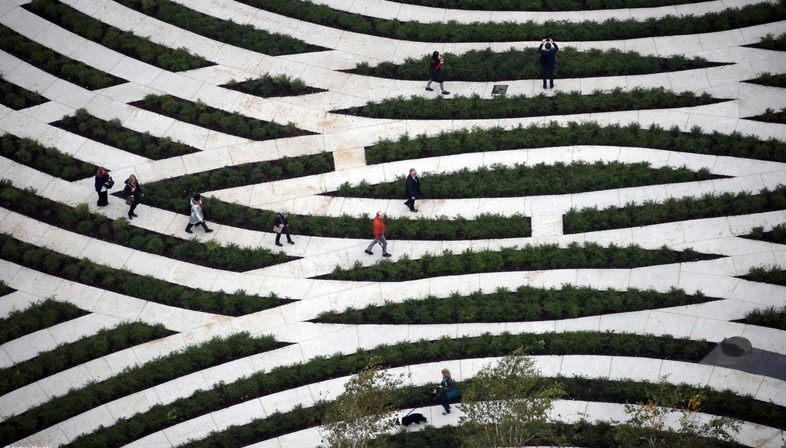
I had the pleasure to talk with Alida Forte Catella, architect and established interior designer, tireless source of ideas and Vice-president of the foundation. Full of initiative and talent, in the 80s with her husband she founded the company COIMA Image, dedicated to integrated design, Interior Design and Space Planning, of which she is the CEO, followed by the new brand 'Dolce Vita Homes', focused in the high quality and sustainability of prestigious residential projects. Both activities successfully carry out an enormous amount of work. Despite the heavy responsibilities, she devotes most of her energy to an intense philanthropic activity, with a particular passion for the world of youth.
Chosen for the project ‘Donne e Futuro’, among a group of women, who have distinguished themselves as excellences for know-how and professional ethics, she has accepted, with her usual enthusiasm to follow, as mentor, the growth process of new female student talents, assisting them professionally in the transition from the theoretical world of school to the practical one of work.
Riccardo was a man / entrepreneur with a truly enlightened vision not only for the romantic ideals, connected with his poetic and sensitive soul, but also for a vision, I would dare to say, more planetary, perceiving the needs linked to human existence and the necessity to give back a central role to the nature and therefore to the environment. Today 3% of the earth's surface is occupied by cities, 50% of humanity lives in cities and 85% of pollution comes from the urban centers. His ideas have gone beyond the real estate development and have attempted to improve the quality of life in a city such as Milan today. Fondazione Riccardo Catella wants to remember not only Riccardo as a man, but to keep his visions alive, because people never die when they leave us a legacy that continues to perpetrate.
2. ‘Biblioteca degli Alberi: Poetry, Planet and Repair - Designing green spaces for the 21th century ', is the title of a round table for the Icon Design Talks, hosted by the foundation during this Milan Design Week. Which role does poetry have in a district with a smart soul like Porta Nuova?
The word and the narration play an important role in a neighborhood so rich in stories between tradition and innovation to tell. The park, Biblioteca degli Alberi, for example, hosts the poems of twenty citizens who participated in the competition #PercorsiPoetici promoted by the Fondazione Riccardo Catella and the Municipality of Milan in 2017; the poetry of the winners, dedicated to nature in the city, finds space along the park’s avenues. The foundation has also promoted, just last year, a beautiful evening on the occasion of BookCity with texts by great authors who were able to investigate and celebrate the various forms in which nature manifests itself to man. A literary journey that has transformed the public garden of Via De Castillia 28 into a new Arcadia, thanks to the direction of Giampiero Solari and the participation of the Fondazione Milano Scuole Civiche. For 2019, several other projects are planned to enhance literature and poetry.
I am convinced that the best practices generate other best practices. Porta Nuova was the first revival of Milan after a very long period of immobility- an area abandoned for over 50 years, an expression of an urban decay. A virtuosity that has restored confidence, followed by other successes that still continue to capillary infiltrate, almost to detoxify those areas full of bacteria, helping them to germinate again. Consider areas, subject of propaedeutic debates to innovation, such as the Scali Ferroviari and all the real estate developments that are affecting the city, giving back nature, trust and attraction.
4. Even this formula of private management of a park, as a public area, seems to have new proselytes. Do you see the collaboration between private and public a necessity in Italy, in the interest of the community and the safeguard of national heritage?
Certainly the orientation is precisely that of uniting energies, skills and responsibilities in unique projects capable of overcoming the immobile bureaucracy that has penalized and still penalizes our country. We are a wonderful country, incredible for the natural beauty of both the territory and the population. We have creativity, imagination and also great capacity in all fields. We are a model, I would dare to say, unique, we must team up to attract more and more trust.
5. Coima has revolutionized a bit the Milan skyline, transforming an abandoned area into an example of sustainable excellence. Facing the problems that our planet is presenting to us, what do you think should be done?
We must hurry up, we can no longer afford to perpetrate errors and selfishness, we must distribute the common good, starting to take care of other things in an ethical and responsible way. It is time to talk about sustainability, by understanding what it means. Words are important if they have content otherwise they are just slogans. We must actually begin to follow the advice of the green world that silently gives us all the necessary suggestions for a survival that does not consist in being more powerful but in better adapting. So, it is urgent to free the territory to give more space to nature and grow in height where the air is healthier. Porta Nuova project gave us Bosco Verticale, a real estate surprise, that gifts us everyday with a new urban image, and has recalled back a sort of forgotten biodiversity, ready to expand its roots.
6. Is your availability to youth due to having personally experienced how it can be difficult for a young person to face the world of work, without help?
I believe in young people in all their manifestations: even when they present themselves with a negative nature, this is nothing more than their inability to shape themselves, having not received the necessary trust from us, adults, in an age typical of fears, anxieties and uncertainties. Today, it is true, the world of work is extremely difficult and competitive, one reason more to be closer to young people by creating new generations. When I started working, I didn't find any objective difficulty to express myself but they were certainly different times. There were at least more humane and therefore easier conditions. Today, I see young people frightened as if they were in a jungle where survival becomes difficult and the success a chimera to be reached, surely not with the ease that numerous social networks proclaim.
7. Prone, as it has been said, to support young people in general, you seem particularly sympathetic to the feminine cause, helping to promote the importance of its empowerment within society. Do you believe that for women, even today, in the 21st century, remains a strong inequality in work path? or at least that career requires more sacrifices?
I believe both things. However, it also depends on us, women, to change the system. It will take time but I am convinced that in the coming years we will see a radical change on gender values, it will be worth more and more competence, honesty and commitment. And we, women, because of our nature, are masters of these values.
8. Is it possible, in your opinion, any complementarity between man's and woman's work? Did you have this type of working relationship as a wife?
I think that man and woman are made to be together, combining forces and energies for common projects, using the peculiarities that each of the sexes has in their DNA. We are complementary, we must stop thinking we are opposites. My luck was to be next to a man who believed in the value of women and who has always helped me to grow, first of all for myself and then to develop our external relationships.
9. "Luck does not exist, there is a time when talent meets opportunity", Seneca. It is an aphorism that introduces a section of the project ‘Donne e Futuro’, with which you collaborate. In your opinion, enthusiasm, determination and competence are sufficient to succeed?
Yes, are certainly three necessary qualities and I would like to add a touch of luck, when of course luck is not only casual but also a mental elaboration that helps to seize the moment.
10. Children, too, occupy an important part of your commitment: is there any new sprouting program of the foundation you intend to talk about?
Fondazione Riccardo Catella, together with COIMA SGR, is working on an innovative public-private partnership for the management of the park Biblioteca degli Alberi. The foundation will be the private entity responsible for the park management, maintenance and safety, as well as for promoting a cultural program of inclusive, innovative, citizen engagement, whose goal is to position the park as a new international landmark, a place of open air cultural enjoyment in the city of Milan. Furthermore, in July 2019, the FRC promotes the second edition of Porta Nuova Smart Camp, in collaboration with Dynamo Camp and L’abilità Onlus. An inclusive project that brings together children with disabilities or serious and chronic diseases and healthy children in a common experience. Nature, sustainable architecture and technological innovation are the central themes of the Camp's activities, in conjunction with the values of Fondazione Riccardo Catella and Porta Nuova district.
I would like to thank Alida Catella for her spontaneous availability and to conclude with a message from ’Donne x il Domani': “To nourish the dreams of the women of tomorrow, we need the concrete actions of today's women”. It gives me the opportunity to express to her my admiration for her precious example and tireless contribution, foundations for a healthier and stronger society of the future.
Credits:
Alida Forte Catella: Coima Image: http://www.coimaimage.it, Fondazione Riccardo Catella : http://www.fondazionericcardocatella.org/it/
Photography: Andrea Cherchi










